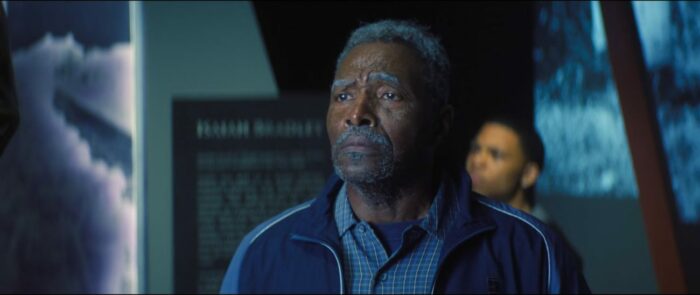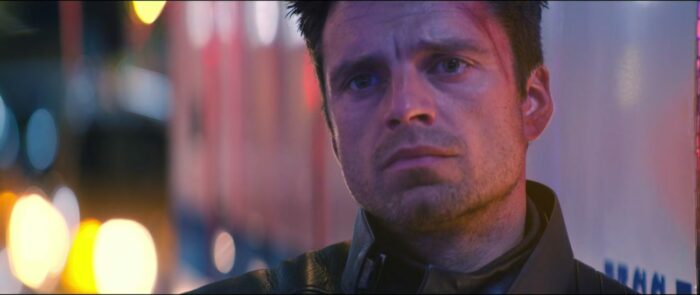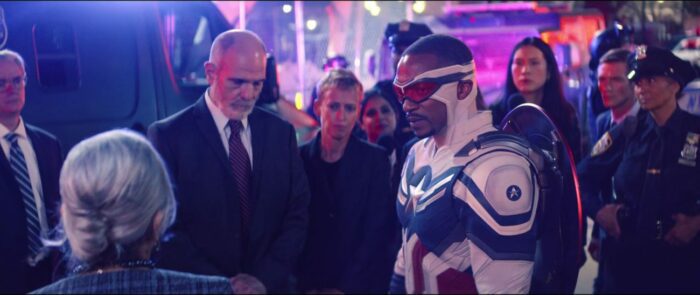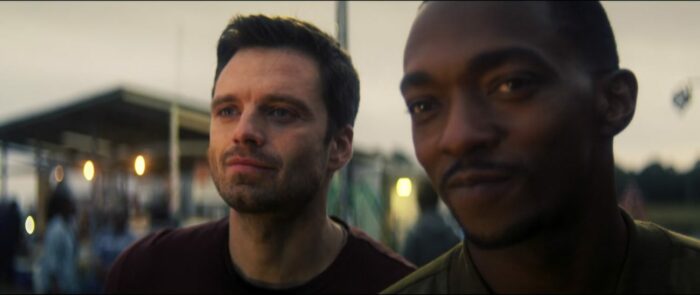As we experience the end of The Falcon and the Winter Soldier in S1E6, it becomes increasingly apparent that, as audience, we entered the series asking entirely the wrong question.
While Steve Rogers, having given up his life as Captain America, bequeathed his shield to his close friend Sam Wilson (Anthony Mackie) at the end of Avengers: Endgame, he was passing on a torch. The idea of Captain America, born through Steve of genetic experimentation to create a ‘supersoldier’, the apex of American strength to counter the fascist eugenic dystopia wanted by Nazi Germany, was to symbolise truth, justice and the American way in World War II, easily defined by history as a conflict of good and evil when the reality was always anything but. American history simply didn’t turn their own vivid cruelty, white supremacy and genocide into a crusade for global domination. They internalised, ignored and ultimately chose to forget about it as they morphed into a capitalist democracy.
Steve Rogers always symbolised a fallacy, an American wish-fulfilment and propaganda that worked during WW2. He was a good man but he never truly understood the big picture. After being thawed out and reviving Captain America as a symbol for the early 21st century, missing over half a century of American transformation from democratic liberator of fascism into a dominant geopolitical powerhouse of neoliberalism. He missed the struggles that defined America across the 20th century, particularly the hard fought battle of Civil Rights for people of colour, a fight that reached an apex in the 1960s and became a cultural acceptance for America, if not a battle fully won. “You ain’t no Malcolm, Martin, Mandela” Isaiah Bradley (Carl Lumbly) tells Sam in ‘One World, One People’. The echoes of that struggle live on in every black man, woman and child.

So when Steve gave Sam the shield, he didn’t appreciate the weight of not just expectation but symbolic consideration. Sam was never just inheriting a shield, a suit and a place in the Avengers, he was inheriting a tarnished visage of American fallacy. Steve tried to do the right thing. He fought the fascist underbelly that has always existed in America, from the Klan to Donald Trump, as he rooted out HYDRA at the heart of SHIELD in The Winter Soldier. He tried to defend the right of heroes, superpowers, powered by technology and simply fuelled by mysticism, against the geopolitical realities of supra-governmental consequences in Civil War. He never really stopped fighting the war and he did it by what has become clear in The Falcon and the Winter Soldier was his own personal code, not that of the country he represented.
The shield, therefore, represents Steve as this series begins. “It feels like it belongs to someone else,” Sam remarked in ‘New World Order’. He understood that truth. He understood the shield didn’t reflect America in the way Steve hoped it might, and that simply taking it on was not the simple task his friend might have imagined. “I’ll do my best” Sam said in Endgame. “That’s why it’s yours,” Steve replied. He saw the shield as reflecting Sam’s ethics, morals and innate sense of justice. He passed the torch to a friend who upheld what he believed to be the American way without the consideration of how America, and the world, would perceive it. “Every time I pick this thing up, I know there are millions of people who are gonna hate me for it,” Sam later says, as he attempts to adopt the mantle Steve wanted for him.
Before the series began, fans saw the question surrounding the show as being who would ultimately become Captain America. Would it be Sam, Steve’s choice, or Bucky Barnes (Sebastian Stan), the former Winter Soldier, who was present at the moment his old friend passed on the shield? In the lore of Marvel comics, both held. Bucky inherited the mantle first, in 2005’s Captain America (vol. 5), as the former tool of Cold War exploitation, the American soldier transformed into a Manchurian candidate to fight against his country, became the symbol of American hope and goodness. Sam took the role later. In both cases, these were 21st century decisions. Across the entire 20th century, Steve Rogers was Captain America. Only the modern era of Marvel challenges that supremacy.

Ultimately, The Falcon and the Winter Soldier suggests this question didn’t matter. It was never about who should become Captain America. It was about why Sam should become Captain America, in the face of decades, nay centuries, of racial murder, prejudice and historical erasure that is now facing a justifiable reckoning in America and across the West. Isaiah is so important in this equation across the run of the series because he epitomises the whitewashing of American history that has happened for so long, and Sam in becoming the Captain America Isaiah was locked away for threatening to be, provides the kind of restitution black society are still waiting for. Isaiah is rewritten back into American history. “Now, they’ll never forget what you did for this country. Never,” Sam promises.
It vindicates a choice that could easily have gone two different ways. Sam could have put on the updated (and very snazzy) hybridised Falcon/Captain America suit to stop the Flag Smashers and then rejected the mantle, aware too pressingly of the ugly power of white supremacy that undergirds the idea of how he was created in the 1940s. “No super serum, no blond hair, or blue eyes,” Sam describes himself as Cap, pointedly. He could have walked away, with the corruption and tragedy of John Walker (Wyatt Russell) as proof of what Captain America symbolises. Yet Sam chooses to become what Isaiah believed could never exist. “The only power I have is that I believe we can do better,” Sam claims, and this is the key. Steve as Cap represented what America convinced itself it was. Walker as Cap is what America actually became. Sam as Cap is what America could be.
Marvel have taken considerable steps in recent years to engage audiences with stories that speak to the black experience, particularly Black Panther. That was a moment in itself, in how it presented Africa as a beacon of progressive honour and truth, lost to history in the shadow of colonialist revisionism. Later this year, Ms Marvel will present the first Muslim-born heroine ever platformed to such a degree in Iman Vellani’s Kamala Khan. The idea of Sam Wilson as a black Captain America, however, could end up being a truly profound and powerful moment for not just the Marvel Cinematic Universe but the projection of black storytelling as a whole in Western culture. It is a decision that very pointedly suggests the future of America, a future built on goodness and tolerance, is carried by a black voice.

The fact Sam helps save and addresses not the American government but the Global Repatriation Council—the kind of global unified body that sounds almost utopian in construction and slightly divorced from reality—only underscores just how much Malcolm Spellman’s vision for this character is to evoke the kind of restitutional hope for an America no longer terrified of the world but embracing the role it believed it once had, to lead it for good.
The delay in production that allowed Spellman to retool elements of the series in the wake of Covid-19 feels even more acute in how Sam reckons with these people. “We finally have a common struggle now. Think about that. For once, all the people who’ve been begging, and I mean literally begging for you feel how hard any given day is… now you know. How did it feel to be helpless? Now if you could remember what it was like to be helpless and face a force so powerful it could erase half the planet, you would know that you’re about to have the exact same impact.”
In what could be my favourite touch, Sam refuses to position the ill-fated and ultimately misguided Karli Morgenthau (Erin Kellyman) as the true villain. Walker tries to destroy her, Sam refuses to even fight her. Once she has died, he tries to make those she wanted to kill understand why she did what she did. “You can control the banks. You can knock down a forest with an email, you can feed a million people with a phone call. But the question is, who’s in the room when you make those decisions? Is it the people you’re gonna impact? Or is it just more people like you?” Sam is not just a black representation of American tolerance, he is openly stepping beyond borders, beyond boundaries, and questioning the simple pure ethics behind global inequality. Karli was misguided, and deserved punishment, but she really was driven by a hopeful, progressive vision. One world, one people. Borderless, equal and free. It doesn’t sound too much to ask.
The GRC attempt to suggest Sam is proposing simple solutions to complex equations and he is, but encoded is a challenge to the established systems of power that Marvel seem devoted to highlighting in future in their storytelling. Walker, though proving himself perhaps worthy of some redemption in this episode, is happily taking on the ‘dark Cap’ mantle of US Agent, perhaps unaware of what he now represents: orthodoxy decaying slowly under the weight of social, cultural and environmental change, desperately attempting to claw to power. ‘Val’ (Julia Louis-Dreyfus) promises an America, perhaps a world, about to be upended in much the way progressives felt in 2016. “Things are about to get weird. So, when they do, we’re not gonna need a Captain America”.

She could be in league with who we learn is the ‘Power Broker’ within Madripoor and beyond, Sharon Carter (Emily VanCamp), now restored by the US government after years in exile but corrupted, much like Walker, by the excesses of privilege. She now intends to utilise frayed American democracy for her own gain. As America attempts to recover from the existential trauma of the Trump age, and remains deeply polarised and ideologically sectarian, so perhaps the MCU will now look to depict this two Americas, two people, as Sam Wilson—in his new role—faces enemies not from outer space but from within. He knows he will face prejudice, ingrained structural racism and hate, as Captain America in a way Steve Rogers would never have known, but he almost has no choice. “I might fail,” he tells Isaiah. “Sh*t, I might die. But we built this country. Bled for it. I’m not gonna let anybody tell me I can’t fight for it. Not after what everybody before me went through. Including you”.
The answer to the right question, therefore, is that of course Sam Wilson should be Captain America. As the MCU, and the world, enters a whole new phase, it is a moment that could not have happened sooner.

